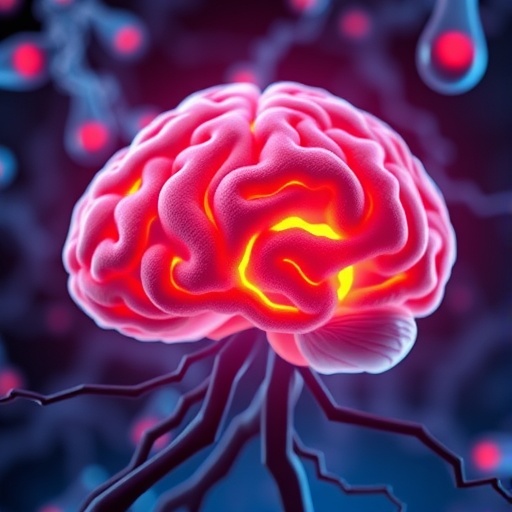In an age marked by rapid advancements in the field of neuroscience, emerging studies continue to explore the multifaceted role of various bioactive compounds in combating neurodegenerative diseases. A breakthrough study led by researchers Ang, Bhuvanendran, and Lee investigates the potential of tocotrienol, a member of the vitamin E family, to modulate the NF-κB signaling pathway, which is pivotal in inflammation and cellular survival mechanisms in neural tissues.
Neurodegenerative diseases such as Alzheimer’s, Parkinson’s, and amyotrophic lateral sclerosis (ALS) represent some of the most pressing challenges in modern medicine. These conditions are characterized by the progressive degeneration of neurons, leading to cognitive decline, motor dysfunction, and ultimately significant disability. A substantial body of evidence suggests that inflammation plays a critical role in the pathogenesis of these disorders. However, the interplay between neuroinflammation and neuronal health remains complex and poorly understood.
Tocotrienol, often overshadowed by its more prevalent counterpart, tocopherol, has garnered attention for its neuroprotective properties. Unlike tocopherols, tocotrienols are known for their unique structural features that confer distinct biological activities. The study at hand provides a compelling narrative on how tocotrienol can influence NF-κB signaling, a crucial mediator of inflammatory responses in the brain.
The NF-κB (nuclear factor kappa-light-chain-enhancer of activated B cells) pathway is a critical signaling cascade that regulates the expression of various pro-inflammatory cytokines and stress-related genes. In healthy neurons, NF-κB activity is tightly controlled; however, in neurodegenerative states, aberrant activation of this pathway often leads to sustained inflammation and neuronal death. The investigation led by Ang et al. postulates that tocotrienol could serve as a beneficial agent to downregulate excessive NF-κB activation.
In their study, the researchers employed a series of in vitro experiments to elucidate the specific mechanisms through which tocotrienol modulates the NF-κB pathway. They observed that tocotrienol administration led to a significant reduction in the phosphorylation of IκBα, a critical inhibitor of NF-κB. This decrement in phosphorylation prevents the degradation of IκBα, thus maintaining NF-κB in its inactive form within the cytoplasm and preventing its translocation to the nucleus.
Moreover, the team explored the downstream effects of NF-κB suppression through tocotrienol treatment. They reported a notable decrease in the expression of pro-inflammatory cytokines, including TNF-α, IL-6, and IL-1β, which are typically elevated in neurodegenerative conditions. By mitigating these inflammatory signals, tocotrienol may not only preserve neuronal integrity but also promote a healthier neural environment conducive to recovery.
The findings are particularly exciting in light of previous research that established the detrimental effects of chronic inflammation on cognitive function and neuroprotection. With tocotrienol’s capacity to dampen NF-κB signaling, the implications for developing novel therapeutic strategies aimed at neuroprotection and inflammation modulation are profound.
Furthermore, the researchers emphasized the importance of dietary sources rich in tocotrienols, such as palm oil, rice bran oil, and certain nuts and seeds. Integrating these foods into the diet may provide a natural avenue for enhancing neuroprotective defenses against the backdrop of neurodegenerative diseases. This dietary approach aligns with a broader trend in health and wellness that advocates for leveraging natural compounds to support brain health.
While the study opens exciting pathways for tocotrienols in clinical applications, it also underlines the necessity for further research to translate these findings into effective therapies. Clinical trials will be critical to establish efficacy, optimal dosages, and the potential for tocotrienols to be used in combination with existing treatments.
In summary, the study by Ang, Bhuvanendran, and Lee sheds light on the complex interplay between tocotrienol and NF-κB signaling in the context of neurodegenerative diseases. As the scientific community strives for innovative solutions to combat lethal neurodegenerative diseases, tocotrienol emerges as a promising candidate. Continued exploration in this arena may yield pivotal advancements in safeguarding neuronal health and enhancing the quality of life for those afflicted.
As researchers persist in untangling the intricate web of neuroinflammation and degeneration, the implications of tocotrienol could pave the way for groundbreaking therapies that harness the body’s natural mechanisms to fight against neurodegenerative disorders. In a world where neurodegenerative diseases are on the rise, such discoveries provide a glimmer of hope for better management and treatment strategies in the near future.
In conclusion, Ang et al.’s exploration into tocotrienol’s role in modulating NF-κB presents a foundational piece in the mosaic of neurodegenerative research. The findings underscore the potential of dietary interventions guided by bioactive compounds and herald a new chapter in neurotherapeutics. As we anticipate future developments from ongoing research, it is clear that there exists a rich reservoir of knowledge yet to be unraveled, offering pathways toward a healthier future for neurodegenerative disease management.
Subject of Research: Modulation of NF-κB signaling pathway by tocotrienol in neurodegenerative diseases.
Article Title: Modulation of NF-κB signaling pathway by tocotrienol in neurodegenerative diseases.
Article References:
Ang, S.Y., Bhuvanendran, S., Lee, V.L.L. et al. Modulation of NF-κB signaling pathway by tocotrienol in neurodegenerative diseases.
Discov Ment Health 5, 160 (2025). https://doi.org/10.1007/s44192-025-00254-x
Image Credits: AI Generated
DOI: 10.1007/s44192-025-00254-x
Keywords: tocotrienol, NF-κB signaling, neurodegenerative diseases, inflammation, cytokines




